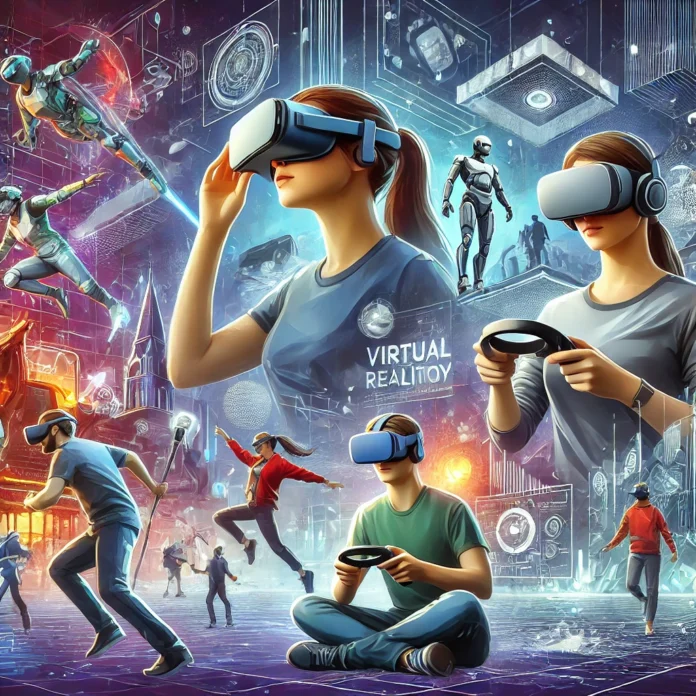Introduction
Virtual reality (VR) has revolutionized the way we interact with digital content, offering immersive experiences that transport us to entirely new worlds. From gaming and education to training and therapy, VR technology is redefining various fields and providing unique opportunities for engagement and learning. This article delves into the fascinating realm of virtual reality experiences, highlighting their impact, popular applications, and future potential.
The Impact of Virtual Reality
1. Immersive Entertainment
One of the most significant impacts of virtual reality is its ability to provide immersive entertainment. VR games and simulations offer a level of engagement and realism that traditional media cannot match. Players can step into the shoes of their favorite characters, explore fantastical worlds, and experience adventures in a highly interactive environment. This heightened sense of presence and involvement makes VR a powerful tool for entertainment.
2. Enhanced Learning and Education
Virtual reality experiences are transforming education by making learning more interactive and engaging. VR can take students on virtual field trips to historical sites, allow them to explore the inner workings of the human body, or even simulate complex scientific experiments. This hands-on approach enhances understanding and retention, making learning more effective and enjoyable.
3. Professional Training and Simulation
In various industries, VR is used for training and simulation purposes. Pilots, surgeons, and military personnel, for example, can practice their skills in a controlled and safe virtual environment. This not only reduces the risk of errors in real-life scenarios but also allows for repeated practice without the associated costs or dangers. VR training modules can be tailored to specific needs, making them a versatile tool for professional development.
Popular Applications of Virtual Reality
1. VR Gaming
Gaming is perhaps the most well-known application of virtual reality. VR gaming systems like Oculus Rift, PlayStation VR, and HTC Vive have gained widespread popularity, offering a range of games that cater to different tastes and preferences. From action-packed adventures to relaxing puzzle games, VR gaming provides an unparalleled level of immersion and excitement.
2. Virtual Tourism
Virtual reality has opened up new possibilities for tourism. With VR, users can explore famous landmarks, visit museums, or even take a stroll through distant cities without leaving their homes. This virtual tourism experience allows people to satisfy their wanderlust and learn about different cultures and places interactively and engagingly.
3. Health and Therapy
In the healthcare sector, VR is used for various therapeutic purposes. It can help patients manage pain, reduce anxiety, and even treat phobias through exposure therapy. VR environments can be customized to meet the specific needs of patients, providing a controlled and safe space for therapy. This innovative use of VR is improving patient outcomes and expanding the possibilities for mental health treatment.
4. Social Interaction
Virtual reality experiences are also changing the way we interact socially. VR platforms like VRChat and AltspaceVR allow users to meet and interact with others in virtual spaces. These platforms offer various activities, from casual hangouts to organized events, providing a new way for people to connect and socialize. The sense of presence in VR makes these interactions feel more genuine and immersive than traditional online communication.

The Future of Virtual Reality
1. Technological Advancements
The future of virtual reality looks promising, with continuous advancements in technology set to enhance VR experiences further. Improvements in graphics, motion tracking, and haptic feedback will make virtual environments more realistic and interactive. As hardware becomes more affordable and accessible, the adoption of VR technology is expected to grow.
2. Expanded Applications
Beyond gaming and entertainment, VR will likely see expanded applications in fields such as education, healthcare, real estate, and beyond. Virtual classrooms, remote medical consultations, and immersive property tours are just a few examples of how VR can revolutionize different industries. The potential for VR to create impactful and meaningful experiences is vast and largely untapped.
3. Greater Accessibility
As VR technology advances, efforts are being made to make it more accessible to a broader audience. This includes developing user-friendly interfaces, reducing costs, and creating more inclusive content. By addressing these challenges, VR can become a mainstream technology that benefits people from all walks of life.
Conclusion
Virtual reality experiences are transforming the way we engage with digital content, offering immersive and interactive opportunities across various fields. From gaming and education to healthcare and social interaction, VR is redefining what is possible and paving the way for a future where virtual and physical realities seamlessly blend. As technology continues to evolve, the potential for virtual reality experiences is boundless, promising a thrilling and innovative journey ahead.




